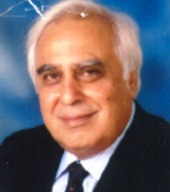 | « Back to article | Print this article |
IIT-govt stand off resolved: Sibal
 The month-long standoff between the government and the IIT faculty over pay structure was 'resolved' on Friday with the HRD ministry agreeing to revisit the contentious norms, including 40 per cent cap on promotion of professors to senior grade.
The month-long standoff between the government and the IIT faculty over pay structure was 'resolved' on Friday with the HRD ministry agreeing to revisit the contentious norms, including 40 per cent cap on promotion of professors to senior grade.
The IIT faculty expressed happiness over its hour-long meeting with HRD minister Kapil Sibal to discuss the contentious issues but did not announce an end to their agitation.
The minister assured them that the board of governors of IITs can 'deviate from the existing norms in exceptional cases to promote excellence'.
"All issues between IIT faculty and HRD ministry over pay structure have been resolved. Our guidelines are just norms and there can be flexibility or relaxation in exceptional cases," Sibal told reporters after the meeting.
The IIT faculty said the flexibility of the IIT system will help the institutes move forward.
"The minister has assured us about IIT retaining flexibility and they can relax norms. We are happy that these norms can be taken off by the board if necessary. But we will discuss with the directors on Saturday about implementation. We will take final decision on our agitational plan after that," Prof M Thenmozhi, president of All India IIT Faculty Federation, said.
The minister also assured the faculty that in case of any serious problem, they can raise the issue at the IIT Council meeting through their directors.
The government on August 18 notified the pay structure for centrally funded technical institutions, including the IITs and IIMs. The IIT faculty, however, protested certain 'anomalies' in the pay structure.
The government then issued amended notification twice, but failed to satisfy the faculty.
The faculty has been demanding withdrawal of 40 per cent cap on promotion of professors to senior grade.
They were also opposing the provision of contractual appointment at entry level. Sibal said the government is ready to revisit the norms for 'whatever is good for the IIT system'.
"Down the line, if we find that more than 40 per cent of teachers are eligible for the senior grade, we will revisit the norms," he said.
Regarding the faculty's demand for abolition of contractual appointment, he said the IIT system has the flexibility to deviate from the norms. In case of non-availability of faculty in a particular department, for example nano-technology, the IITs could relax the norms to absorb people, he said.
"Norms can be deviated from subject to certain conditions. The conditions can be laid down by the IIT directors and boards," he said.
The minister asked the faculty to resolve certain other demands by meeting their directors.
The IIT faculty is meeting the IIT directors on Saturday to take up those issues. The pay structure norms say that ten years of experience, including four years at associate professor level, is required for promotion to professor.
The faculty has been demanding flexibility in that norms so that even if a teacher has just one or two years of experience at associate professor level he can be promoted to the upper level.
The government norms say that assistant professors with three years experience are entitled for Pay Band-4. However, many teachers join this position with more than three years of experience.
The faculty is demanding extra incentives for them. "We will discuss with the directors about how they are going to implement the relaxations as assured by the ministers. We will raise the other issues, including flexibility in promotion.
The federation will meet again and take the final decision on its agitational plan," Thenmozhi said.
Sibal said he has convened the meeting of IIT Council on October 19 where the futuristic vision of the IITs would be discussed.
Image: Kapil Sibal